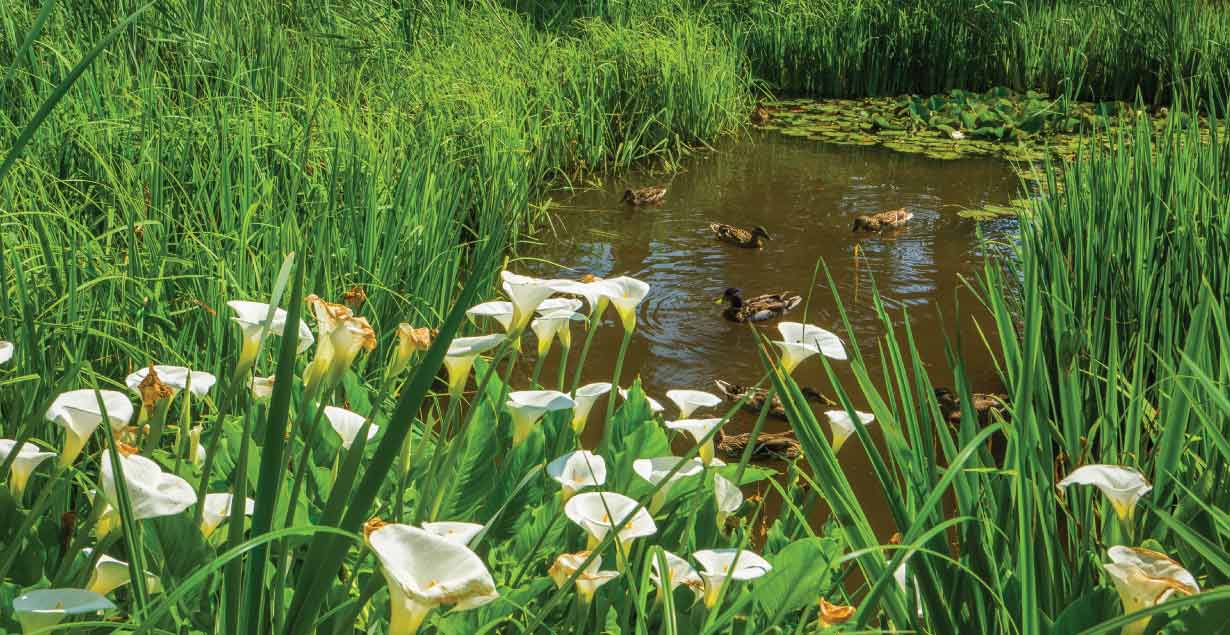Protect UK Biodiversity
Support nature restoration, enhance your sustainability goals, and create lasting impact for wildlife and communities across the UK.

What is Biodiversity?
Biodiversity refers to the incredible variety of life on Earth, from tiny insects and vibrant wildflowers to towering trees and rare mammals. It includes every living organism and the complex ecosystems they form.
A rich and healthy biodiversity supports clean air, fresh water, fertile soils, and a stable climate. It’s the foundation of our food systems, medicines, and overall wellbeing.

Why is Biodiversity Important?
Biodiversity goes far beyond protecting a few rare species, it underpins the very systems that sustain human life. Thriving, diverse ecosystems help absorb and store carbon, playing a vital role in the fight against climate change. They also support pollinators, which are essential for growing the food we eat, and help maintain healthy soils and clean water. In addition, rich biodiversity strengthens our natural landscapes, making them more resilient to flooding, extreme weather, and other environmental shocks.
Despite its importance, biodiversity is under serious threat. Across the UK, nature is in decline at an alarming rate; since the 1970s, populations of many species have fallen by as much as 41%. Habitat destruction, pollution, overexploitation, and the impacts of climate change have all contributed to this crisis, putting both wildlife and our own future at risk.
Biodiversity Credits
Biodiversity credits offer a practical way for businesses to take responsibility for their environmental impact by directly supporting nature restoration projects. By investing in biodiversity credits, organisations can help protect threatened species, restore degraded habitats, and enhance ecosystems both locally and globally.
These credits go beyond simple carbon offsetting; they represent measurable contributions to reversing biodiversity loss and supporting a healthier, more resilient natural world.
For businesses looking to demonstrate genuine leadership in sustainability, biodiversity credits provide a credible and impactful solution that aligns with evolving regulations and stakeholder expectations.


Habitat Units
Habitat units are a key part of the Biodiversity Net Gain approach in the UK, designed to ensure that any development leaves the natural environment in a better state than before. Each habitat unit quantifies the ecological value of a specific area, taking into account its size, quality, and distinctiveness.
By securing and enhancing these units, developers and businesses can offset the impacts of their projects while actively contributing to the recovery of local wildlife and ecosystems. Investing in habitat units not only helps meet legal requirements but also showcases a meaningful commitment to environmental stewardship and long-term sustainability.
Learn MoreWhy Choose Tariff.com?
In a rapidly changing world, businesses need to stay adaptable to appeal to top talent and keep customers loyal. Ignoring environmental and social responsibilities not only damages your reputation but can also threaten your long-term success.
By working with us, your organisation can lead the way in a new era that unites business growth with true care for people and the planet.

Start Your Net-Zero Journey Today
Climate change is increasingly urgent for governments, companies, and consumers alike. We all have a responsibility to make changes, including businesses, who will be closely watched by many. After all, doing right by the planet is doing right by your customers.
However, your transition to net-zero doesn’t have be a burden. Tariff.com empowers businesses to change for the better, offering tailored support to make sustainability simpler. We employ a comprehensive 5-step strategy to transform your emissions and revolutionise your energy usage.
Our 5 Step Strategy

1. Calculate
We’ll measure the carbon footprint and environmental impact of your business.

2. Target
We’ll help you set achievable targets to tackle your emissions.

3. Reduce
We’ll help reduce your consumption and optimise energy usage.

4. Offset
We’ll offset your remaining emissions with carbon credits and environmental projects.

5. Results
We’ll measure the carbon footprint and environmental impact of your business.
Frequently Asked Questions
While carbon credits focus on offsetting greenhouse gas emissions, biodiversity credits aim to directly enhance or restore ecosystems and species diversity. They complement each other and address different aspects of environmental responsibility.
Credits are usually verified by independent ecological experts or certification bodies to ensure the conservation outcomes are real, measurable, and long-lasting.
You can start by assessing your environmental impact, setting biodiversity goals, purchasing biodiversity or habitat credits, enhancing green spaces on-site, and partnering with trusted conservation organisations. By working with us, your organisation can lead the way in a new era that unites business growth with true care for people and the planet
By securing and enhancing these units, developers and businesses can offset the impacts of their projects while actively contributing to the recovery of local wildlife and ecosystems. This helps to achieve the government policy in England that requires developers to leave the natural environment in a better state than before.
Currently, biodiversity credits are voluntary in most cases but are increasingly encouraged as part of corporate social responsibility and net gain commitments. Certain local planning rules may require habitat or biodiversity enhancements.
Supporting biodiversity can strengthen your brand reputation, increase customer loyalty, meet stakeholder expectations, and help achieve sustainability and ESG targets.
Biodiversity Net Gain is a government policy in England requiring developers to leave the natural environment in a better state than before. It typically involves creating or enhancing habitats to achieve a measurable net improvement in biodiversity.
With the UK committing to become full net-zero by 2050, it falls to businesses and enterprises to significantly reduce and offset their emissions. Woodland Credits are an integral part of that, allowing for companies to counteract their remaining emissions and to officially declare themselves as “net-zero” ahead of the 2050 deadline.
Ready to Take Action?
enquiry@tariff.com
WE CAN HELP WITH...
- Net-Zero Solutions
- Renewable Energy
- Solar Panels
- Business Gas
- Business Electricity
- Business Water
- Electronic Vehicle Charging















